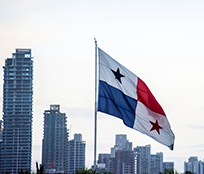The Backstory of Panama’s Presidential and Legislative Elections
On May 5, José Raúl Mulino, the candidate endorsed by popular former president Ricardo Martinelli, won the presidential election with 34% of the vote. The election also produced a fragmented congress, with independent candidates surprisingly capturing 21 of 71 seats. Mulino’s Realizing Goals party secured 13 seats, and he is likely to receive backing from the ruling Democratic Revolutionary Party (12 seats) as well as Martinelli’s former party, Democratic Change (8 seats), getting him relatively close to a simple majority.
Mulino will inherit a country facing several pressing challenges including moderating growth, elevated social discontent, weak fiscal dynamics and an underfunded pension system, to name a few. Fitch has recently downgraded Panama to below investment-grade, and we expect the other rating agencies to follow if the incoming administration is unable to right the ship in a timely manner. To further complicate the situation, Panama had to unilaterally terminate its newly negotiated contract with First Quantum and shut down the Cobre Panamá mine after weeks of social protests and a Supreme Court ruling that deemed the contract unconstitutional.


What We Expect
Mulino’s victory likely means a continuation of current policies. The Mulino administration has signaled that it will focus on water issues at the canal as well as addressing much-needed pension reform. In addition, fiscal consolidation in Panama has been difficult to carry out. Panama barely met its fiscal target last year, thanks to a few one-off items. In order to satisfy the fiscal responsibility law for 2024, Panama needs to significantly reduce its budget deficit. However, we anticipate only marginal improvements in revenue collection and have reservations about how much public investments and government expenditures the new administration can cut back in an election year, not to mention losing revenues from the closed mine. As a result, the chance of any fiscal improvements this year remains slim.
Among other pressing issues, reopening the Cobre Panamá mine faces immense unpopularity among the broader population, and reaching a consensus on terms is likely to pose a significant political challenge. With only 34% of the votes and a fragmented congress, the Mulino administration will likely prioritize other initiatives and postpone discussions on reopening the mine. Nevertheless, it’s an issue that could have major longer-term implications. While the economic impact of the mine’s closure on Panama’s GDP and revenues is not catastrophic, but also not negligible, mishandling the issue could dampen foreign investors’ confidence in the country’s business environment and future return prospects. Importantly, Panama could also face a contingent liability of US$10 billion to US$30 billion if the international arbitration case brought by First Quantum is ruled against the country. Although we understand the arbitration could take years and the final outcome remains uncertain, it is a significant tail risk that should not be ignored.
In conclusion, the Mulino administration faces a number of pressing and challenging issues, amid a slowing economy and elevated social discontent. Having received only a third of votes in the presidential election, Mulino’s political capital is further constrained by a fragmented congress that has a large representation of “independents,” so he will need to pick his battles and strategize his priorities. As a result, we expect volatility to remain high for Panamanian assets as the Mulino administration tackles these must-fix problems.



